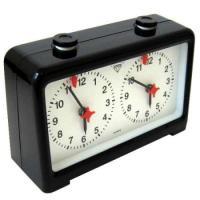
Time Management
Andrea Coda asked:
I am playing online chess mostly as preparation for OTB tournaments, and I am focusing on slow games; I believe that at my level it is very important to reason through every move, trying to increase my board vision and analysis skills, and slow games are ideal for this. However, I am thinking of introducing some 15’/Game chess tournaments, mainly for logistics reasons: I cannot play more than a couple of slow tournaments a year, which would be about 10/12 games in “competitive mode”, and I feel the need for more tournaments play. Which suggestions could you give me, with regards to time management for this kind of (relatively) fast games?
In particular: do you think that trying to “remain hooked” to the opponent in terms of time is a good strategy (i.e. trying not to remain behind your opponent for what time is concerned, “mimicking” his time management strategy)?
Dear Ms. Coda:
I think the more games you play the better. There is no greater teacher than raw experience. 15 minute chess is a relatively fast time control (of course, 1 minute, 3 minute, and 5 minute are all the rage with chess addicts who play 10 hour online sessions a night – often powering back dozens of Red Bulls as one game ends and the next is set into motion in never-ending staccato fashion), but it also allows for moments of actual thought.
The first step to 15-minute success is to know your opening. If you use most of your time in the first moves, you’ll drown in the complications when the real battle begins. On the other hand, if you don’t know your opening but still toss out quick opening moves so that you have time “for later,” you’ll start the game with an awful position and all the time in the world won’t save you.
I should add that “knowing your opening” doesn’t just allude to the book moves. It mainly calls for a solid knowledge of the typical structures and plans and tactical ideas associated with the systems you play. That allows you to make quick but sensible moves deep into the middlegame and gives you a huge edge over most of the opposition (who won’t know these things).
When the opening is over and done with and you’ve reached new and wonderful vistas, use your time to make sure you don’t fall for silly tricks, and to map out a logical plan. Once you have that plan, other moves will come fast and natural.
Never try to “remain hooked” (as you put it) to the opponent! When you do that, you’re not playing the game anymore. Instead you’re stepping into some odd, self-destructive psychological bog that, quite honestly, won’t end well. Your time is there to use when needed, and your goal in 15 minute is to use it intelligently. Moving fast because your opponent is moving fast isn’t even chess, so please do try and avoid that.
Let me add that in any time control, you should never pay attention to how much time your opponent uses. Worry about his moves, not his time! Don't get involved in his melodrama! Those that do pay attention to the opponent's time fall for all sorts of tricks
I've witnessed players who, seeing that they are losing, deliberately let their clocks tick until they only have seconds left. The idea is that the opponent will employ the, "I don't want him to think on my time, so I'll move fast and prevent it" strategy. This "brilliant" idea effectively nullifies your advantage on the clock and leaves you tossing out moves so quickly that blunders are almost a given. It's a dead end philosophy that has left countless players sitting in a corner wondering how they failed to win an overwhelming position.
Simply put, when you play chess the idea is to make good moves, not quick ones!






